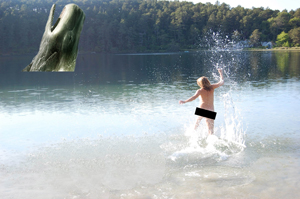“Nothing Exists in Itself”
Brrr. It’s a chilly grey day in Austin, the coldest so far this winter, and a very good day for hot baths and wool socks. It’s the beauty of contrast. If it weren’t for the bitter winds and cold rain puddles, hot baths and wool socks wouldn’t be nearly so marvelous (well, actually, maybe hot baths are always marvelous). It’s like when my friend Charlie and I, in college, made what we considered to be a thrilling discovery: we were trying to hike Enchanted Rock on a blustery winter day and we thought we were so clever to drink our hot tea OUTSIDE in the cold where it would really taste good, as opposed to within the warm interior of his beat up old van, the Voyager. We thought we had mastered the art of delight—always enjoy something amid a context of contrast.
While soaking here in the tub at the end of the coldest day so far this year, I think about how much Melville nails this codependence of qualities in Moby Dick. (I also think about the liner notes that Bob Dylan wrote in the cover for his album Desire, they went something like ‘These lines were written in a bathtub in Maine under ideal conditions”). In a particularly stunning paragraph in the Chapter 11, The Nightgown, Melville writes about something so simple as enjoying a snuggle under the covers on a cold morning, but then he zooms out to make a brilliant statement about the true nature of life in general that is all the more impactful for being only four words long: “Nothing exists in itself.” Boom. Everything is contingent.
Here’s the paragraph, one of the best in literature if you ask me, all the more so for being so timeless. Ishmael and Queequeg are just waking up at the Spouter Inn:
We felt very nice and snug, the more so since it was so chilly out of doors; indeed out of bed-clothes too, seeing that there was no fire in the room. The more so, I say, because truly to enjoy bodily warmth, some small part of you must be cold, for there is no quality in this world that is not what it is merely by contrast. Nothing exists in itself. If you flatter yourself that you are all over comfortable, and have been so a long time, then you cannot be said to be comfortable any more. But if, like Queequeg and me in the bed, the tip of your nose or the crown of your head be slightly chilled, why then, indeed, in the general consciousness you feel most delightfully and unmistakably warm. For this reason a sleeping apartment should never be furnished with a fire, which is one of the luxurious discomforts of the rich. For the height of this sort of deliciousness is to have nothing but the blanket between you and your snugness and the cold of the outer air. Then there you lie like the one warm spark in the heart of an arctic crystal.
There is so much in this one paragraph. To enjoy something, part of you must know its opposite, or something different. To enjoy the warmth, you must feel a little bit cold. To understand joy, you have to feel crummy sometimes. To fully live, you’ve got to know something about death. To taste the tea at ‘the height of its deliciousness,’ we had to try standing in the cold. Nothing exists in itself—it is all about relationship..
And what about this funny juxtaposition—“the luxurious discomforts of the rich?” Love it. I think about it now every time I am wearing uncomfortable fancy shoes or digesting foie gras.






